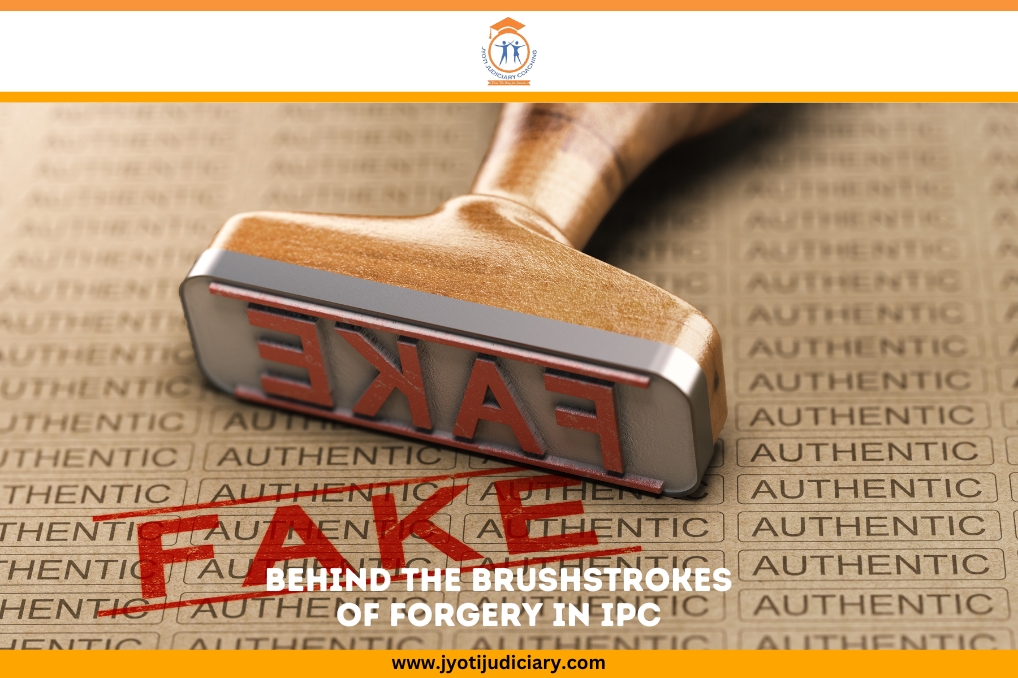
There are instances where someone tries to trick someone by pretending to provide a document that is false in reality while making every effort to make it appear as legitimate as possible in order to gain an unfair advantage from it. One person will lose money from these acts while others will profit.
Therefore, Section 463 was added to the Indian Penal Code, 1860 in order to stop such instances from happening in Indian society. This clause only and in-depthly defines the crime of “making a false document,” which is a necessary step in committing forgery which is the more serious crime. The purpose of this article is to clarify the subtleties related to this Section.
Forgery in IPC
- The forgery meaning in law is not as unambiguous and direct as English common law.
- But as per Section 463 of IPC, forgery is the act of creating any false document, false electronic record, or portion of a document or electronic record with the intent to harm the public or any individual, to bolster a claim or title, to coerce someone into giving up property, to enter into an express or implied contract, or having the knowledge that deception might be carried out.
Types of Forgery
- cheque forgery: When you fill out a cheque either more than the amount you were permitted to or without the account holder’s consent. Cheque forging is the term for this.
- computer forgery: Computer forgery is a crime that can occur when someone modifies computerized documents. In this case, criminal activity is directed towards computer systems. On the other hand, computers can also be exploited as tools for forgeries.
- contract forgery: In order to engage in an agreement that the other side never agreed to, someone may counterfeit a signature on a contract. Conflicts and legal problems may result from this.
- credit card forgery: When unauthorized individuals obtain a person’s credit card information, they may use it to make purchases, conduct other transactions, or open new accounts, which is known as credit card forgery.
- currency forgery: Money created without a state’s or government’s legal authorization is known as counterfeit money, and it is typically generated with the intention of pretending to be real money in order to trick its intended receiver. Generating or employing counterfeit currency is called currency forgery, and it is prohibited in every global jurisdiction.
- cyber forgery/ digital forgery: The act of editing or modifying digital content, such as pictures, videos, or documents, with the goal of misleading or deceiving people is known as “digital or cyber forgery.” It entails using digital technologies and methods to produce false or misleading images that seem real and authentic.
Forgery IPC 468
- The IPC’s Section 468 addresses forgeries committed with the intent to deceive.
- The law stipulates that anyone found guilty of forgery with the intent to use the falsified document or electronic record for fraudulent purposes faces up to seven years in jail of any kind in addition to a significant fine.
Cheating and Forgery IPC Section: Difference
- The IPC provides an explanation of forgeries in Sections 463-477. The IPC’s Sections 415-420 provide an explanation of cheating.
- A fine or a two-year sentence may be imposed for forgery. A seven-year prison sentence or a fine is imposed for cheating.
- Only property and title deeds may be harmed or damaged by forgeries. Cheating can be harmful to one’s physical or mental health, reputation, or possessions.
- While cheating is connected to the “offence against property,” forgery is connected to “documents and property marks.”
- Forgery is tied to the property’s title and has an indirect connection to the property, whereas cheating is related to the full asset.
- Forging is sometimes done with the intention of cheating, however, cheating is regarded as a broad offense that includes forging within its definition.
Forgery in IPC: Essentials
- The document has to be fictitious or fake.
- Must harm the general public or any individual.
- Dishonestly modifies the claim or title of someone.
- Impacts a person’s property title.
- Make someone give up something they own.
- It is an offense for which there is no compounding or recognition.
Forgery Punishment
- The IPC’s Section 465 addresses the pressing charges for forgery.
- It stipulates that anyone found guilty of forgery faces a maximum sentence of two years in prison of any kind, a fine, or both.
The crime of forgery is performed so frequently in modern society. Such crimes are frequently committed by an individual or group of people. For instance: Section 463 of the IPC applies to anyone who entered the territory of another nation with the intent to commit a crime using a fake passport or any other document. With criminal laws such as Section 463, courts have found numerous people guilty in various cases pertaining to it.
Forgery in IPC FAQs
1. What are the essentials of forgery?
The act of creating a fake document with the goal of doing harm or damage, using a document that has been created fraudulently in order to deceive, and using a forged document as authentic are all implied to be components of forgery based on the information supplied.
2. Why is the preparation of forgery not punishable?
Forgery is only considered an offense when a false document is created in accordance with Section 464 IPC. The two terms “preparation” and “attempt” to conduct an offense are very different.
3. How do you defend a forgery case?
It is the responsibility of the prosecution to establish each and every component of the crime beyond a reasonable doubt.
- Lack of intent
- Lack of capacity or knowledge
- Coercion
- Consent
4. Who has to prove forgery?
The plaintiffs have the burden of proof to support their allegation of forgery, and if they have transferred the land to various parties and lack a cause of action, their petition for a declaration of ownership and perpetual injunction is unmaintainable.
5. Is forgery criminal or civil?
A criminal offense is forgery. Forgery accusations are typically brought at the state level, although under specific conditions, they may be brought as federal offenses. Which state or federal court will hear your case depends on its specifics as well as the statutes that apply.
6. What is the punishment for forging documents?
Anyone found guilty of forgery under Section 465 of IPC faces a maximum sentence of two years in prison of any kind, a fine, or both.
7. Is forgery a cognizable offence?
The offense is non-cognizable, bailable, subject to a first-class magistrate’s trial, and not compoundable.
8. Which forgery is the most common?
The most common kind of document forgery is document adjustment. Made documents are entirely handcrafted to mimic authentic documents. Privately created documents are frequently of poor quality and are clearly recognizable.
9. What to do if you are accused of forgery?
You should speak with a criminal defense attorney to go over any potential defense in the event that you are charged with forgery. Being in possession of or producing phony documents is by no means the worst thing you can do, if no other malevolent actions take place.
10. Is forgery contempt of court?
Criminal contempt of court applies to the filing of fraudulent affidavits, counterfeit documents, and false statements made under oath.
11. Why is forgery done?
Documents used for identity and authentication, bank records, lottery tickets, and many other things are all forged. The methods used to identify forgeries can also be applied to the examination of inadvertently damaged papers, even in cases where fraudulent change may not be suspected.
12. Which coaching is best for the judiciary?
The most excellent judiciary coaching in Jaipur is provided by Jyoti Judiciary Coaching. Its goal is to create a comfortable learning environment for the pupils. It makes the difficult task appear easy, which increases the likelihood of achieving the desired outcome. The goal at Jyoti Judiciary is to give you the finest education possible. The Institute pledges to use every resource at its disposal to provide you with the finest preparation for the Judicial Service entrance examinations.
13. Which coaching is best for RJS preparation?
“Jyoti Judiciary Coaching” is a reputable coaching program in Jaipur that helps prepare students for the RJS exam. The finest online and offline RJS coaching program in Jaipur, Jyoti Judiciary, enables a methodical approach to preparing for the RJS examination. Their curriculum has been carefully designed to cover all the subjects and courses needed to pass the Rajasthan Judicial Services Exams.
Read to know: Corruption in India
With the goal of giving students the best coaching available for law entrance exams including the CLAT, AILET, and various other numerous state judiciary exams, Jyoti Judiciary Coaching, India’s Finest educational Platform, was established. Come enroll now with Jyoti Judiciary!
For any latest news, legal topics, judiciary exams notifications, patterns, etc watch Jyoti Judiciary’s YouTube channel for legal videos for any updates at https://youtube.com/@jyotijudiciarycoaching4852?si=2cwubh9d2A9urwJf










